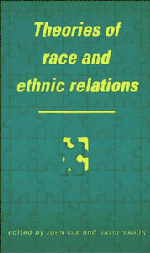Book contents
- Frontmatter
- Contents
- List of contributors
- Preface
- Introduction. Controversies and continuities in race and ethnic relations theory
- 1 Intersecting strands in the theorisation of race and ethnic relations
- 2 Epistemological assumptions in the study of racial differentiation
- 3 The role of class analysis in the study of race relations – a Weberian perspective
- 4 Varieties of Marxist conceptions of ‘race’, class and the state: a critical analysis
- 5 Class concepts, class struggle and racism
- 6 A political analysis of local struggles for racial equality
- 7 Ethnicity and Third World development: political and academic contexts
- 8 Social anthropological models of inter-ethnic relations
- 9 Pluralism, race and ethnicity in selected African countries
- 10 Ethnicity and the boundary process in context
- 11 Ethnicity and the sociobiology debate
- 12 Rational choice theory and the study of race and ethnic relations
- 13 The ‘Chicago School’ of American sociology, symbolic interactionism, and race relations theory
- 14 The operationalisation of identity theory in racial and ethnic relations
- Bibliography
- Index
10 - Ethnicity and the boundary process in context
Published online by Cambridge University Press: 01 June 2011
- Frontmatter
- Contents
- List of contributors
- Preface
- Introduction. Controversies and continuities in race and ethnic relations theory
- 1 Intersecting strands in the theorisation of race and ethnic relations
- 2 Epistemological assumptions in the study of racial differentiation
- 3 The role of class analysis in the study of race relations – a Weberian perspective
- 4 Varieties of Marxist conceptions of ‘race’, class and the state: a critical analysis
- 5 Class concepts, class struggle and racism
- 6 A political analysis of local struggles for racial equality
- 7 Ethnicity and Third World development: political and academic contexts
- 8 Social anthropological models of inter-ethnic relations
- 9 Pluralism, race and ethnicity in selected African countries
- 10 Ethnicity and the boundary process in context
- 11 Ethnicity and the sociobiology debate
- 12 Rational choice theory and the study of race and ethnic relations
- 13 The ‘Chicago School’ of American sociology, symbolic interactionism, and race relations theory
- 14 The operationalisation of identity theory in racial and ethnic relations
- Bibliography
- Index
Summary
Ethnic categories are organisational vessels that may be given varying amounts and forms of content in different sociocultural systems. They may be of great relevance to behaviour but they need not be; they may provide all social life, or they may be relevant only in limited sectors of activity.
(Barth 1969b: 14)Introduction
Various kinds of context are relevant to an anthropological discussion of ethnic boundary processes: the analytic context of custom and practice in the discipline; the practical context of popular and official discourse on population difference; and the social context in which ethnicity is expressed. This paper refers to all of them but treats only the last at length. It identifies a logic which extends the explanatory value of the approach illustrated by the quotation at the top of this page and reports the dimensions of context affecting ethnic relations in two inner London areas. The result is summarised in four linked propositions which suggest a general theory of boundary process and have important implications for practical policy.
For the purposes of this multi-disciplinary volume three background points may be useful. The first is that relative to other social scientists, anthropologists are seldom professionally concerned with vertical relations between ethnic groups and macro-state structures, and they rarely undertake studies of social stratification and minority status as such.
- Type
- Chapter
- Information
- Theories of Race and Ethnic Relations , pp. 226 - 245Publisher: Cambridge University PressPrint publication year: 1986
- 45
- Cited by

